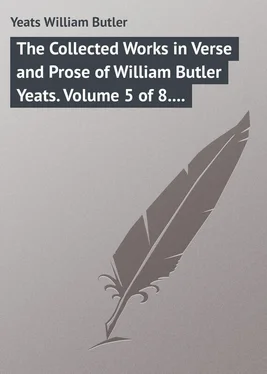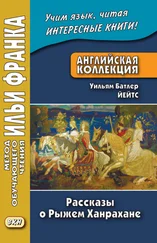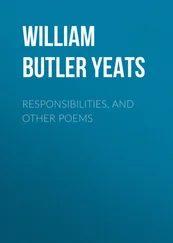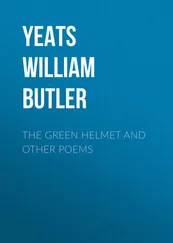William Yeats - The Collected Works in Verse and Prose of William Butler Yeats. Volume 5 of 8. The Celtic Twilight and Stories of Red Hanrahan
Здесь есть возможность читать онлайн «William Yeats - The Collected Works in Verse and Prose of William Butler Yeats. Volume 5 of 8. The Celtic Twilight and Stories of Red Hanrahan» — ознакомительный отрывок электронной книги совершенно бесплатно, а после прочтения отрывка купить полную версию. В некоторых случаях можно слушать аудио, скачать через торрент в формате fb2 и присутствует краткое содержание. ISBN: , Жанр: foreign_language, foreign_prose, на английском языке. Описание произведения, (предисловие) а так же отзывы посетителей доступны на портале библиотеки ЛибКат.
- Название:The Collected Works in Verse and Prose of William Butler Yeats. Volume 5 of 8. The Celtic Twilight and Stories of Red Hanrahan
- Автор:
- Жанр:
- Год:неизвестен
- ISBN:http://www.gutenberg.org/ebooks/49612
- Рейтинг книги:4 / 5. Голосов: 1
-
Избранное:Добавить в избранное
- Отзывы:
-
Ваша оценка:
- 80
- 1
- 2
- 3
- 4
- 5
The Collected Works in Verse and Prose of William Butler Yeats. Volume 5 of 8. The Celtic Twilight and Stories of Red Hanrahan: краткое содержание, описание и аннотация
Предлагаем к чтению аннотацию, описание, краткое содержание или предисловие (зависит от того, что написал сам автор книги «The Collected Works in Verse and Prose of William Butler Yeats. Volume 5 of 8. The Celtic Twilight and Stories of Red Hanrahan»). Если вы не нашли необходимую информацию о книге — напишите в комментариях, мы постараемся отыскать её.
The Collected Works in Verse and Prose of William Butler Yeats. Volume 5 of 8. The Celtic Twilight and Stories of Red Hanrahan — читать онлайн ознакомительный отрывок
Ниже представлен текст книги, разбитый по страницам. Система сохранения места последней прочитанной страницы, позволяет с удобством читать онлайн бесплатно книгу «The Collected Works in Verse and Prose of William Butler Yeats. Volume 5 of 8. The Celtic Twilight and Stories of Red Hanrahan», без необходимости каждый раз заново искать на чём Вы остановились. Поставьте закладку, и сможете в любой момент перейти на страницу, на которой закончили чтение.
Интервал:
Закладка:
A friend of mine met a man once who had been with him when he died, but the people say that he died alone, and one Maurteen Gillane told Dr. Hyde that all night long a light was seen streaming up to heaven from the roof of the house where he lay, and ‘that was the angels who were with him’; and all night long there was a great light in the hovel, ‘and that was the angels who were waking him. They gave that honour to him because he was so good a poet, and sang such religious songs.’ It may be that in a few years Fable, who changes mortalities to immortalities in her cauldron, will have changed Mary Hynes and Raftery to perfect symbols of the sorrow of beauty and of the magnificence and penury of dreams.
1900.When I was in a northern town awhile ago I had a long talk with a man who had lived in a neighbouring country district when he was a boy. He told me that when a very beautiful girl was born in a family that had not been noted for good looks, her beauty was thought to have come from the Sidhe, and to bring misfortune with it. He went over the names of several beautiful girls that he had known, and said that beauty had never brought happiness to anybody. It was a thing, he said, to be proud of and afraid of. I wish I had written out his words at the time, for they were more picturesque than my memory of them.
1902.A KNIGHT OF THE SHEEP
Away to the north of Ben Bulben and Cope’s mountain lives ‘a strong farmer,’ a knight of the sheep they would have called him in the Gaelic days. Proud of his descent from one of the most fighting clans of the Middle Ages, he is a man of force alike in his words and in his deeds. There is but one man that swears like him, and this man lives far away upon the mountain. ‘Father in heaven, what have I done to deserve this?’ he says when he has lost his pipe; and no man but he who lives on the mountain can rival his language on a fair day over a bargain. He is passionate and abrupt in his movements, and when angry tosses his white beard about with his left hand.
One day I was dining with him when the servant-maid announced a certain Mr. O’Donnell. A sudden silence fell upon the old man and upon his two daughters. At last the eldest daughter said somewhat severely to her father, ‘Go and ask him to come in and dine.’ The old man went out, and then came in looking greatly relieved, and said, ‘He says he will not dine with us.’ ‘Go out,’ said the daughter, ‘and ask him into the back parlour, and give him some whiskey.’ Her father, who had just finished his dinner, obeyed sullenly, and I heard the door of the back parlour – a little room where the daughters sat and sewed during the evening – shut to behind the men. The daughter then turned to me and said, ‘Mr. O’Donnell is the tax-gatherer, and last year he raised our taxes, and my father was very angry, and when he came, brought him into the dairy, and sent the dairy-woman away on a message, and then swore at him a great deal. “I will teach you, sir,” O’Donnell replied, “that the law can protect its officers”; but my father reminded him that he had no witness. At last my father got tired, and sorry too, and said he would show him a short way home. When they were half-way to the main road they came on a man of my father’s who was ploughing, and this somehow brought back remembrance of the wrong. He sent the man away on a message, and began to swear at the tax-gatherer again. When I heard of it I was disgusted that he should have made such a fuss over a miserable creature like O’Donnell; and when I heard a few weeks ago that O’Donnell’s only son had died and left him heart-broken, I resolved to make my father be kind to him next time he came.’
She then went out to see a neighbour, and I sauntered towards the back parlour. When I came to the door I heard angry voices inside. The two men were evidently getting on to the tax again, for I could hear them bandying figures to and fro. I opened the door; at sight of my face the farmer was reminded of his peaceful intentions, and asked me if I knew where the whiskey was. I had seen him put it into the cupboard, and was able therefore to find it and get it out, looking at the thin, grief-struck face of the tax-gatherer. He was rather older than my friend, and very much more feeble and worn, and of a very different type. He was not like him, a robust, successful man, but rather one of those whose feet find no resting-place upon the earth. I recognized one of the children of reverie, and said, ‘You are doubtless of the stock of the old O’Donnells. I know well the hole in the river where their treasure lies buried under the guard of a serpent with many heads.’ ‘Yes, sur,’ he replied, ‘I am the last of a line princes.’
We then fell to talking of many commonplace things, and my friend did not once toss up his beard, but was very friendly. At last the gaunt old tax-gatherer got up to go, and my friend said, ‘I hope we will have a glass together next year.’ ‘No, no,’ was the answer, ‘I shall be dead next year,’ ‘I too have lost sons,’ said the other, in quite a gentle voice. ‘But your sons were not like my son.’ And then the two men parted, with an angry flush and bitter hearts, and had I not cast between them some common words or other, might not have parted, but have fallen rather into an angry discussion of the value of their dead sons. If I had not pity for all the children of reverie I should have let them fight it out, and would now have many a wonderful oath to record.
The knight of the sheep would have had the victory, for no soul that wears this garment of blood and clay can surpass him. He was but once beaten; and this is his tale of how it was. He and some farm hands were playing at cards in a small cabin that stood against the end of a big barn. A wicked woman had once lived in this cabin. Suddenly one of the players threw down an ace and began to swear without any cause. His swearing was so dreadful that the others stood up, and my friend said, ‘All is not right here; there is a spirit in him.’ They ran to the door that led into the barn to get away as quickly as possible. The wooden bolt would not move, so the knight of the sheep took a saw which stood against the wall near at hand, and sawed through the bolt, and at once the door flew open with a bang, as though some one had been holding it, and they fled through.
AN ENDURING HEART
One day a friend of mine was making a sketch of my Knight of the Sheep. The old man’s daughter was sitting by, and, when the conversation drifted to love and love-making, she said, ‘Oh, father, tell him about your love affair.’ The old man took his pipe out of his mouth, and said, ‘Nobody ever marries the woman he loves,’ and then, with a chuckle, ‘there were fifteen of them I liked better than the woman I married,’ and he repeated many women’s names. He went on to tell how when he was a lad he had worked for his grandfather, his mother’s father, and was called (my friend has forgotten why) by his grandfather’s name, which we will say was Doran. He had a great friend, whom I shall call John Byrne; and one day he and his friend went to Queenstown to await an emigrant ship, that was to take John Byrne to America. When they were walking along the quay, they saw a girl sitting on a seat, crying miserably, and two men standing up in front of her quarrelling with one another. Doran said, ‘I think I know what is wrong. That man will be her brother, and that man will be her lover, and the brother is sending her to America to get her away from the lover. How she is crying! but I think I could console her myself.’ Presently the lover and brother went away, and Doran began to walk up and down before her, saying, ‘Mild weather, Miss,’ or the like. She answered him in a little while, and the three began to talk together. The emigrant ship did not arrive for some days; and the three drove about on outside cars very innocently and happily, seeing everything that was to be seen. When at last the ship came, and Doran had to break it to her that he was not going to America, she cried more after him than after the first lover. Doran whispered to Byrne as he went aboard ship, ‘Now, Byrne, I don’t grudge her to you, but don’t marry young.’
Читать дальшеИнтервал:
Закладка:
Похожие книги на «The Collected Works in Verse and Prose of William Butler Yeats. Volume 5 of 8. The Celtic Twilight and Stories of Red Hanrahan»
Представляем Вашему вниманию похожие книги на «The Collected Works in Verse and Prose of William Butler Yeats. Volume 5 of 8. The Celtic Twilight and Stories of Red Hanrahan» списком для выбора. Мы отобрали схожую по названию и смыслу литературу в надежде предоставить читателям больше вариантов отыскать новые, интересные, ещё непрочитанные произведения.
Обсуждение, отзывы о книге «The Collected Works in Verse and Prose of William Butler Yeats. Volume 5 of 8. The Celtic Twilight and Stories of Red Hanrahan» и просто собственные мнения читателей. Оставьте ваши комментарии, напишите, что Вы думаете о произведении, его смысле или главных героях. Укажите что конкретно понравилось, а что нет, и почему Вы так считаете.












